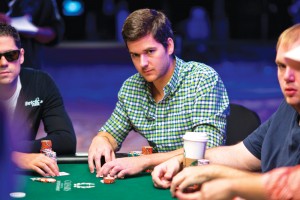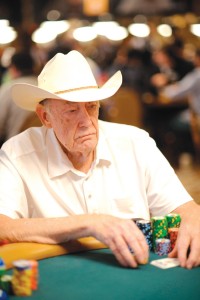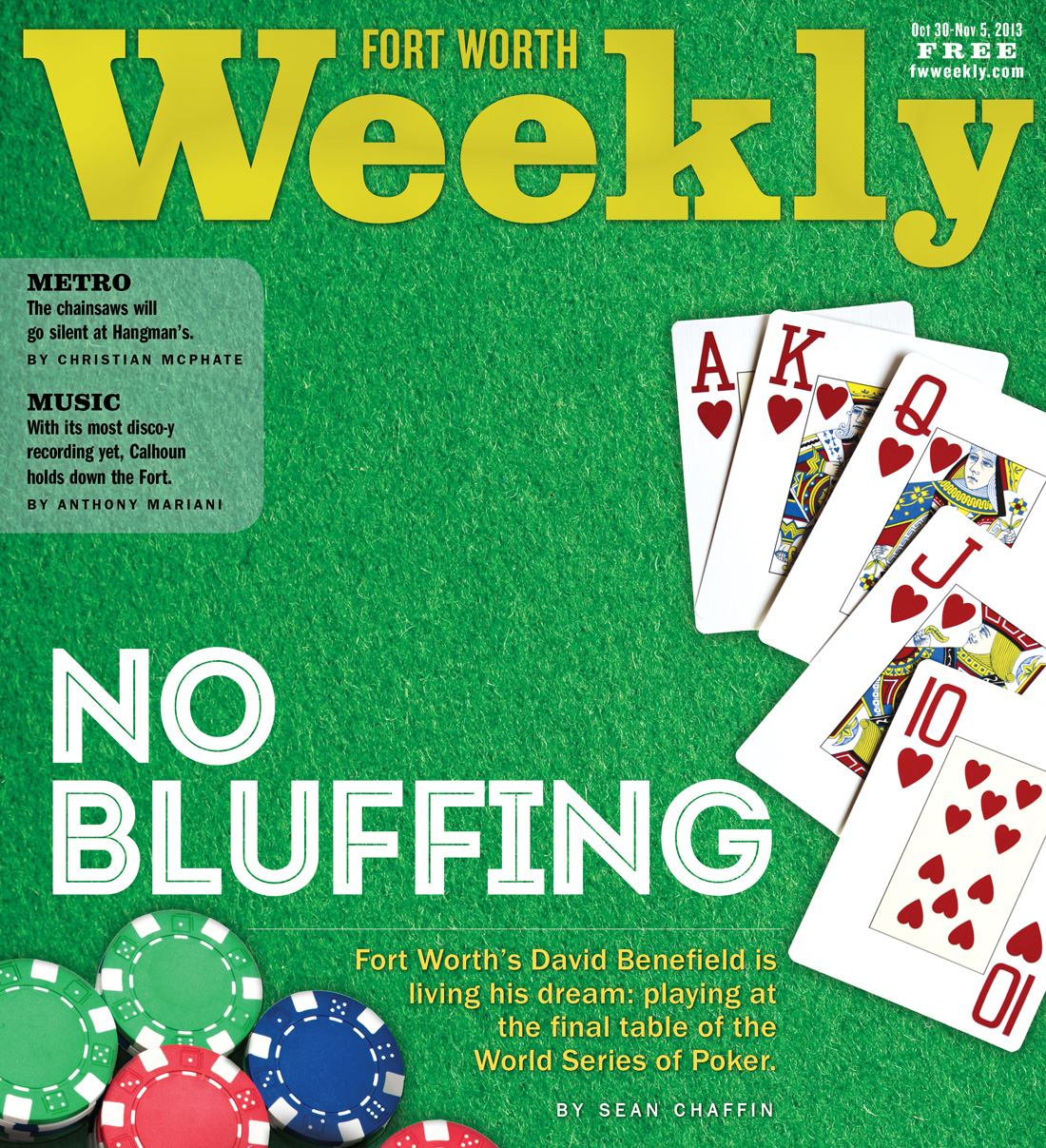The winner of the World Series of Poker’s Main Event leaves with a huge, diamond-encrusted gold bracelet worth probably half a million dollars. David Benefield doesn’t care about that. If he were to win next week, he said, he’d donate the over-the-top bling to charity.
The Fort Worth native is shooting for other parts of the winner’s package: $8.3 million in cash and the honor of being the first Texan in 26 years to bring home the biggest trophy in poker, the game that has been his profession almost since he left high school. If he does, he will join an impressive list of Texans who have made their names at the poker table.
The Penn and Teller Theater at the Rio Hotel and Casino in Las Vegas will be packed on Nov. 4 and 5, as Benefield and eight other players battle it out for the WSOP title, all played out live on ESPN. The 27-year-old won’t go in as the favorite — in fact, he’ll have the smallest chip stack of anybody at the table, based on results of earlier rounds of the tournament. In poker, as in the rest of life, you need money to make money — or, in poker terms, to take chances. Even though many poker superstars rate Benefield as one of the most talented players at the table, it’s not an easy deficit to overcome, especially in the midst of the kind of tension a game like this draws, with the eyes of the poker world watching each card.
On the other hand, having earned a spot at the final table — no mean feat in itself — means Benefield will take home at least $733,224. Not a bad return on a $10,000 gamble he made in July and more than his combined earnings at tournament poker since he dropped out of Texas Christian University not quite a decade ago.
********
Growing up, Benefield said, he was hyper-competitive, easily distracted, and a bit of a troublemaker. His father was a U.S. Navy pilot who later flew for American Airlines. His mother was a professor of nursing, and he describes her as “one of the most driven, intelligent women I have ever met.” Benefield went to the private Oakridge School in Arlington, where he played sports and liked to read sci-fi and fantasy books.

Not the best student, he worked just hard enough to make grades that would keep him out of trouble at home –– and on the baseball team. The sport was his primary focus, but hopes of playing at the collegiate level were dashed when he tore up his shoulder early in his senior year. When he gave up that dream, poker took its place.
“If I didn’t have that injury, I probably would never have gotten into poker,” Benefield said. “At the time I was crushed, but I am happy with how things turned out.”
Like many American boys his age, Benefield started playing Texas hold’em with friends in high school after seeing the movie Rounders. And like many players, his first forays at the poker table weren’t so successful. But he noticed that a couple of players seemed to be more selective at choosing the hands to play and more aggressive when they did so. With his wallet empty after that first night, Benefield went home and ordered some poker books. After consuming as much information as he could, he began winning consistently against friends.
With baseball out of the picture, Benefield began taking the game more and more seriously. What began as just a thing to do with buddies on a Friday night quickly became something different: an abiding dedication to the goal of bettering his game and taking it to a different level. The stakes were low, but those games helped Benefield become a better player.
“The more I improved, the more I realized that poker was a viable option for earning income,” he said. (Poker is legal in Texas as long as the house doesn’t take a cut.)
After graduating from high school in 2004, Benefield enrolled at TCU. But after less than half a semester, he made a change: He was ready to take the plunge into the crazy world of professional poker.

His parents, not surprisingly, were worried by his decision. “They weren’t too happy about that at the time,” Benefield said. But on Nov. 4, they’ll be in his corner in Las Vegas, cheering him on.
The life of a professional poker player is not for the squeamish. Players travel constantly, chasing big tournaments and big cash games. Greg Merson, who won the Main Event last year, said drugs, alcohol, and partying are a big part of the scene. Tales of players with dreams bigger than their bankrolls are common, and “going broke” seems a rite of passage. Perhaps not surprisingly, considering the game they’ve chosen, poker players don’t all grasp the principles of solid financial planning.
“These guys don’t have a boss; they have a lot of extra income and flat out just time to kill, [so] drugs become much more of a fun way to waste time,” Merson said. Steering clear of those hazards on the poker road can be an important key to success.
Benefield was less of the partying type, and success came quickly. Armed with winnings from online and live cash games, Benefield hit the poker road, playing in tournaments and the high-stakes cash games that the tournament scene attracts. He eventually moved his home base to New York City.
In 2008 he made his first big scores in tournament poker, with several nice finishes. That included placing 73rd (for $77,200) in the WSOP Main Event, considered the world championship of poker. Since leaving TCU, he has amassed career live tournament winnings of $633,243, which doesn’t count his healthy winnings in non-tournament play. But the swings in a professional poker player’s finances are nerve-wracking — some months can be losers, no money coming in at all. It took a long time for Benefield to learn to deal with the stress of playing at such a high level for such big dollars.
“Poker is incredibly stressful on an emotional level, which negatively impacts the physical. In my earlier years playing professionally, I was not particularly good at dealing with large monetary losses,” Benefield said. “They hurt me a lot mentally, and I would tend to turn inward. I wouldn’t want to hang out with friends or hit the gym. Rather, I would sit at my computer and figure out how to avoid losses in the future,” he said. “I have gotten much better about this over the years, but losing at my profession was very difficult for me to deal with early on.”
In recent years, Benefield has been focusing primarily on studying political science and Chinese at Columbia University, even spending a summer in Beijing in a language program. His studies have been somewhat on hold since he made the final table.
For now Benefield is a part-time poker player and part-time student. While poker will always be a part of his life, he’s still looking at a more traditional long-term career. His poker winnings have allowed him time to study things he finds interesting. Eventually he hopes to pursue a career related to foreign policy, preferably something in the intelligence or security fields. But for high-level players like him, the WSOP is on the calendar every year.
Clearly, making the final table of the World Series of Poker is no easy task. While luck may enter into the equation, skill is the major determining factor of success or failure.
In July, Benefield was one of more than 6,300 players who ponied up the $10,000 entry fee for a chance at winning the title of poker’s world championship and becoming an instant millionaire.
As he bet and raised his way through the massive field, the long days at the table began to take a toll.
Competitors play 10 to 12 hours a day, and the slightest mistake can take a major bite out of a chip stack or, worse yet, knock a player out of the tournament altogether, sending him or her back to the hotel room contemplating what went wrong.
Around day five, Benefield began feeling sick, and he wasn’t sleeping well. But with so much on the line, none of that seemed to matter. After seven grueling days, Benefield found himself among the final set of players (dubbed the “November Nine”) who will return Nov. 4.
Only when the final table was set, with his name on the list, did he realize how emotionally and physically drained he felt. Unlike some others on the poker scene, Benefield chose a mellow celebration.
“I actually went back to the hotel and slept, then spent most of the next day at the pool reading,” he said. “I am not really a popping-bottles-in-the-club kind of guy.”












